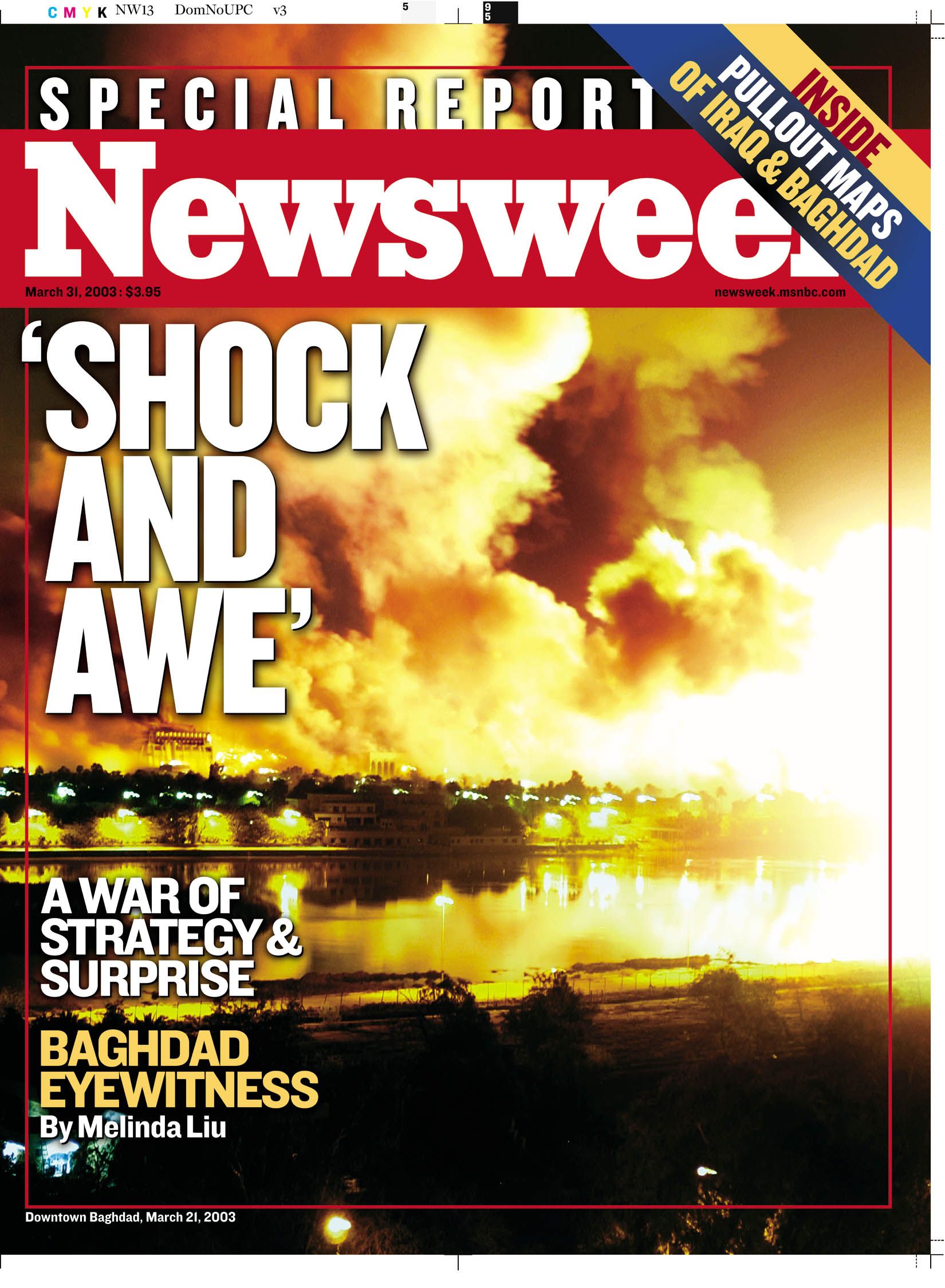
Yesterday marked the 11th anniversary of the U.S. invasion of Iraq—a war that would ultimately claim the lives of more than 4,400 Americans and an estimated 500,000 Iraqis. U.S. troops officially left the country in 2011, but sectarian warfare persists, seen most dramatically in the recent fall of the city of Fallujah to an Al-Qaeda-linked group. The rumored weapons of mass destruction, the major justification for the war, turned out not to exist.
Newsweek's first issue after the bombs dropped on Baghdad was devoted almost entirely to the conflict, with yellow explosions lighting up the Baghdad sky on its cover. "Shock and Awe"—those now-famous words—are written in all caps, superimposed over those billowing explosions.
Jonathan Alter wrote a thoughtful column in the issue titled "Listen for the Human Voice." He pointed out that watching the televised footage of Iraqi government buildings being blown up "required a leap of imagination to picture the Iraqi cleaning women or unlucky bureaucrats dying live worldwide as those buildings were engulfed in flames, unintentionally dead but dead all the same." His broader point was that in a war that was television-ready and high-tech, people were still dying. He also wrote, "I happen to think this [war] was inevitable and therefore necessary," and he concluded by saying that "every war has it master narrative." It was just too early then to tell what this one would be.
Newsweek asked Alter, who spent nearly 30 years working for this magazine before moving to Bloomberg, if there's anything he'd change about the column with 11 years of hindsight. He was unequivocal. "I strongly regret writing that the war was 'inevitable and necessary,' " he said. "I was totally wrong about that, as were scores of other liberal pundits, not to mention conservative ones, and almost every major politician except Barack Obama, who was a state senator at the time. It was a product of essentially believing Colin Powell that there were weapons of mass destruction." As for that master narrative? Now it's apparent, he says: "It was a complete fiasco."
"It was one of the greatest disasters in American history," he added.
The most vivid article in the magazine is a long personal one by Melinda Liu, who was in Baghdad when the bombing began. The story begins with Liu being ordered back to New York—but she was so angry at being forced to leave the country after two months that she decided she would quit Newsweek upon her return. She ended up staying in country, moving into a third-floor room in the rundown Palestine Hotel, and from there she saw, and felt, the bombs hit: "The door of my room shuddered with each concussion," she wrote. "From my balcony I saw tracer fire across the river and one or two spectacular explosions.… We saw plumes of smoke rising on the opposite bank of the river. 'The sky is on fire,' [someone said]."
The piece ends on a claustrophobic note, with Liu holed up in her room, a bed propped on its side against the window. "If the bombing gets too bad," she wrote, "I can retreat to the foyer and close the doors. This is where I've stashed my food and water, an air mattress and sleeping bag and all my essential belongings.… I think I'm ready for whatever comes."
More than a decade after she wrote those words, I asked Liu if she had any thoughts about them, or the war. She joined Newsweek in 1979, and spent more than 18 years as the Beijing bureau chief. "It took me years to get over the sleep deprivation I'd suffered while covering the run-up to the war, the collapse of Saddam's regime and its aftermath," she recalled in an email. Her assignment was to stay in Baghdad until U.S. Marines got there. "I managed to do just that, but it was one of the most harrowing, exhausting, traumatic experiences of my career."
She's grateful, she said, that the timing of her departure allowed her to avoid the "journalistic quagmire" that was the search for WMD. As she was leaving, The New York Times's Judy Miller was there, "appearing remarkably fresh and bright-eyed, wearing a trim camouflage outfit with matching cap." Miller famously was embedded with a military unit that fruitlessly searched for WMD and was faulted for writing articles making claims about Iraq and weapons of mass destruction, drawing on intelligence from Ahmed Chalabi; the Times eventually ran this editor's note about its coverage.
"I was fortunate that exhaustion and journalistic burnout," Liu said, "had shielded me from the big lie of the Iraq war."
She struck a mournful note. "I feel so sad for my Iraqi friends," she says. "I still dream of walking through the jails of Saddam's secret police, finding the rope noose in the execution cell, stumbling upon mass graves (that sickening sweet stench), deciphering the messages written by desperate former prisoners on the prison walls. Some of the cell walls had been red but were subsequently painted white, so that detainees' prayers showed up as red handwriting. In my dreams, the walls are always red."
Newsweek from the U.S. invasion of Iraq
Uncommon Knowledge
Newsweek is committed to challenging conventional wisdom and finding connections in the search for common ground.
Newsweek is committed to challenging conventional wisdom and finding connections in the search for common ground.
About the writer
Rob Verger is liaison to Newsweek’s foreign editions and also reports, writes, and edits. In addition to Newsweek and its ... Read more
To read how Newsweek uses AI as a newsroom tool, Click here.





